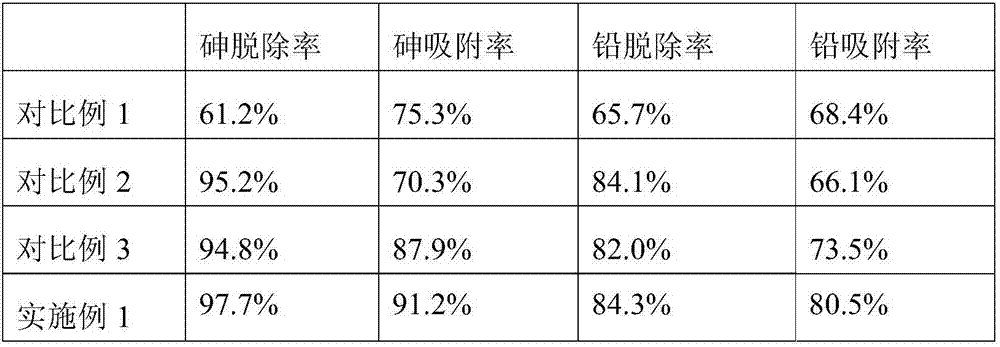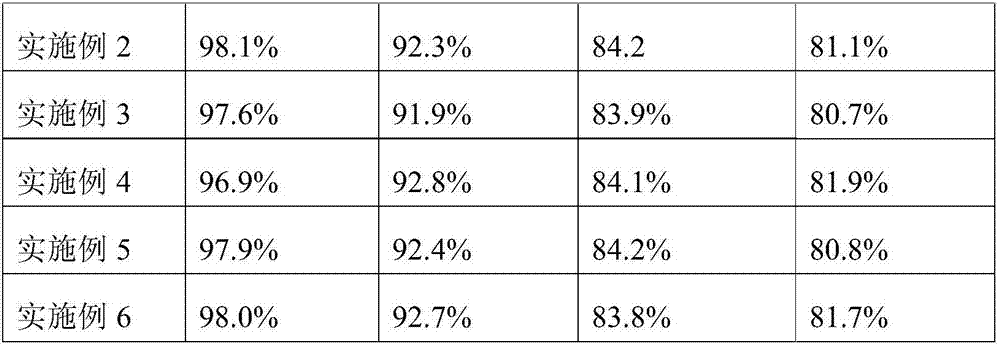Method for removing and adsorbing heavy metals from ciliate desert-grasses
A technology of centipede grass and heavy metals, which is applied in the field of removing and adsorbing heavy metals in centipede grass, can solve the problems of a large amount of smoke, high extraction cost, and large equipment consumption, and achieve the effect of promoting adsorption
- Summary
- Abstract
- Description
- Claims
- Application Information
AI Technical Summary
Problems solved by technology
Method used
Image
Examples
Embodiment 1
[0027] 1. Preliminary preparation:
[0028] Preparation of mercapto-modified sepiolite: in parts by weight, after mixing 100 parts of sepiolite, 3 parts of sodium bicarbonate and 5 parts of sodium acetate, place in a tube furnace, fill with inert gas, and Activation at 200°C and pressure of 0.3MPa for 5h, then add 150 parts of mercaptoacetic acid and 1 part of catalyst, mix well, place in a beaker, react at 100°C for 4h, filter, and wash the filter residue for 3 hours times, and finally after drying, the mercapto-modified sepiolite was obtained.
[0029] Preparation of the mixed bacteria starter: in parts by weight, 12 parts of high temperature bacteria and 10 parts of medium and low temperature bacteria are mixed, and stirred evenly to obtain the mixed bacteria starter.
[0030] The substance prepared above is used in the following method for removing and adsorbing heavy metals from centipede grass.
[0031] 2. A method for removing and adsorbing centipede grass heavy metal...
Embodiment 2
[0036] 1. Preliminary preparation:
[0037] Preparation of mercapto-modified sepiolite: in parts by weight, after mixing 115 parts of sepiolite, 3.5 parts of sodium bicarbonate and 6 parts of sodium acetate, they are placed in a tube furnace, filled with inert gas, and heated at a temperature of Activate at 220°C and 0.35MPa for 6h, then add 160 parts of thioglycolic acid and 1 part of catalyst, mix well, put in a beaker, react at 103°C for 4.5h, filter, and wash the filter residue 3 times, and finally after drying treatment, mercapto-modified sepiolite was obtained.
[0038] Preparation of the mixed bacteria starter: in parts by weight, 16 parts of high temperature bacteria and 15 parts of medium and low temperature bacteria were mixed and stirred evenly to obtain the mixed bacteria starter.
[0039] The substance prepared above is used in the following method for removing and adsorbing heavy metals from centipede grass.
[0040] 2. A method for removing and adsorbing centi...
Embodiment 3
[0045] 1. Preliminary preparation:
[0046] Preparation of mercapto-modified sepiolite: in parts by weight, after mixing 120 parts of sepiolite, 4 parts of sodium bicarbonate and 8 parts of sodium acetate, they are placed in a tube furnace, filled with inert gas, and heated at a temperature of Activate at 240°C and 0.4MPa for 7 hours, then add 165 parts of mercaptoacetic acid and 1 part of catalyst, mix well, place in a beaker, react at 110°C for 5 hours, filter, and wash the filter residue for 3 hours times, and finally after drying, the mercapto-modified sepiolite was obtained.
[0047] Preparation of the mixed bacteria starter: in parts by weight, 20 parts of high-temperature bacteria and 17 parts of medium-low temperature bacteria were mixed and stirred evenly to obtain the mixed bacteria starter.
[0048] The substance prepared above is used in the following method for removing and adsorbing heavy metals from centipede grass.
[0049] 2. A method for removing and adsorb...
PUM
 Login to View More
Login to View More Abstract
Description
Claims
Application Information
 Login to View More
Login to View More - R&D
- Intellectual Property
- Life Sciences
- Materials
- Tech Scout
- Unparalleled Data Quality
- Higher Quality Content
- 60% Fewer Hallucinations
Browse by: Latest US Patents, China's latest patents, Technical Efficacy Thesaurus, Application Domain, Technology Topic, Popular Technical Reports.
© 2025 PatSnap. All rights reserved.Legal|Privacy policy|Modern Slavery Act Transparency Statement|Sitemap|About US| Contact US: help@patsnap.com


